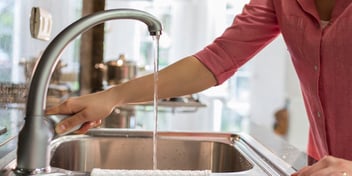Using music to develop water conservation behaviour

Since 2019, Urban Utilities has produced some award-winning water conservation campaigns, including 'Bathroom Beats' and 'How low can you go?', that focused on the importance of maintaining water-wise behaviors, even when dams are full.
Urban Utilities spokesperson Michelle Cull said the utility’s Water Sustainability Communications Strategy take’s an “always on” approach to increasing community awareness and understanding of the water cycle, and factors that impact water supply.
“Our purpose at Urban Utilities is to enrich quality of life and our water conservation efforts keep this top of mind when we communicate with our communities, which play an important role in conserving water,” Cull said.
“As environmental leaders, we are committed to having an 'always on' approach to water sustainability so that our customers and community trust us with the future of their water, environment and regions.”
Following successful communications campaigns focusing on sewer health and the consumption of tap water, in 2019 the utility embarked on water conservation campaigns that encourage communities to develop lasting water-wise habits.
While the campaigns aimed to increase drought awareness and encourage customers to save water, the goal was also to engage the community about the importance of water-wise behaviours all of the time – regardless of dam levels.
“These campaigns were also vital in communicating why we ask the community to reduce their water use, sharing practical ways they can save water and advising them on what actions they needed to take during water restrictions as part of the southeast Queensland drought response,” Cull said.
Challenging old habits
When the combined level of the drinking water dams in southeast Queensland fell below 70% in mid-2019, Urban Utilities began to develop community outreach campaigns that responded to research on how customers were using water in their homes.
“The Bathroom Beats campaign was driven by research that revealed showers accounted for around 30% of household water use. The campaign addressed this specific behaviour with a simple and practical tip – sing your way to savings by taking shorter showers,” Cull said.
“We supported this message with a free Spotify playlist comprising of 50 water-themed songs, all four minutes long or less, which is the time people should be limiting their shower to in order to be waterwise.”
Developed by Urban Utilities, Bathroom Beats was an integrated, end-to-end campaign, which used social media, marketing, community engagement and media relations.
“Bathroom Beats offered a fun, practical way to save water and money, while laying foundations to prepare customers to save further as the drought progressed. This ever-green playlist is still available on Spotify today and continues to encourage water conservation,” Cull said.
Meanwhile, the ‘How low can you go?’ campaign challenged customers to see how much water they were able to save by becoming more aware of their water use habits.
“This was an integrated campaign, which used media, social media, marketing, advertising and community engagement to share the message that you don’t have to bend over backwards to save water, just be mindful of how much you’re using each day,” Cull said.
“The tagline provided a clear call-to-action and spoke to our purpose through asking our community to mindfully use water. Instead of setting a water usage target, the campaign recognised whatever a person’s water usage habits, we can all make small changes to save further.
The face of the campaign was eight-year-old ‘Henry’ who encouraged everyone to adopt water-wise habits as part of their daily activities, so it would become a way of life and be easier to adapt if restrictions were introduced.
“[Henry] delivered simple tips and recognised everyone needs to do their bit to save water,” Cull said.
“By providing a range of indoor and outdoor water saving tips, we aimed to reduce barriers for people to get involved and allow them to choose behaviors that suited their lifestyle.”
Cull said the utility also launched the Sustainable Gardens initiative, which focused on saving water in the garden and aimed to encourage water conservation during warmer months, when water use traditionally increases outdoors.
“We partnered with a local landcare group to build a water-savvy sustainable garden to showcase how to reduce water use,” Cull said.
“Much like our other water conservation campaigns, it focused on sharing practical, real world advice our customers could use which could help them save water while maintaining a thriving backyard or garden.”
Long-term water-wise behaviours
Cull said that while the campaigns proved effective, the utility is beginning to develop more long-term approaches to fostering water security alongside the communities that it serves.
“Southeast Queensland is a popular place, but a growing population and less reliable rainfall over our major dams is putting pressure on our drinking water supplies,” Cull said.
“We understand conserving water is one part of a larger picture when it comes to ensuring water security now and into the future.
“With this in mind, our focus as an organisation is expanding from sharing information around drought specific events and water saving tips, towards a longer-term, more holistic view of water security.
“Our primary focus over the coming months is helping our customers and community understand their relationship with water, and what an important role it plays in their lifestyle – now and into the future.”

